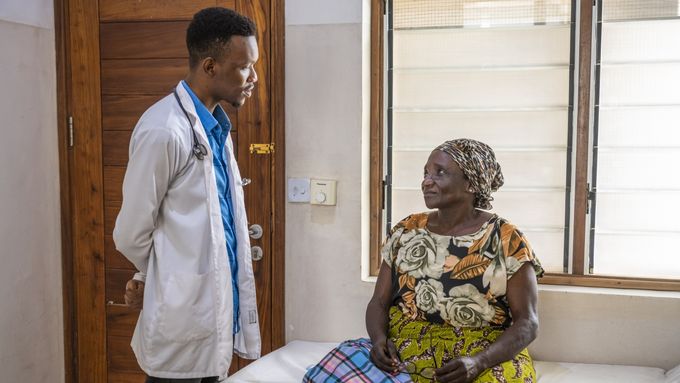20 Years of Pioneering HIV and Chronic Disease Care in Rural Tanzania
17.10.2024
The Chronic Diseases Clinic of Ifakara (CDCI) is celebrating its 20th anniversary, marking two decades of providing healthcare, health training and clinical research in rural Tanzania. Established through a collaboration between Swiss and Tanzanian institutions to support individuals living with HIV/AIDS, CDCI has evolved into a leading model for HIV care in rural Africa. To honour this milestone, the clinic hosted a two-day event focused on HIV/AIDS and non-communicable diseases (NCDs).

As CDCI celebrates its anniversary, experts highlight the growing burden of noncommunicable diseases in rural areas and outline strategies for future health improvements. (Photo: O. Brandenberg/Swiss TPH)
On 16-17 October 2024, the CDCI’s 20-year anniversary event brought together key stakeholders to reflect on its achievements and discuss ongoing challenges of HIV care in rural areas. Discussions centred on issues such as viral resistance, the complexities of caring for children and adolescents, and the management of comorbidities like tuberculosis and NCDs.
Established in 2004, the CDCI is a collaboration between the Swiss Tropical and Public Health Institute (Swiss TPH), the Ifakara Health Institute, the St. Francis Referral Hospital in Ifakara and the Clinic for Infectious Diseases at the University Hospital Basel. The clinic’s core mission has been to improve healthcare access for people living with HIV/AIDS in rural Tanzania while also training local healthcare professionals and advancing clinical research.
Reflecting on this progress, Maja Weisser, Clinical Research Coordinator of the CDCI, emphasized: “This is an important moment to look back at how far we’ve come and to discuss innovative strategies to tackle the remaining challenges for people living with HIV, and increasingly for those in need of chronic care for NCDs.”
Achievements in HIV Care
Since its inception, the CDCI has provided care to more than 12,000 people living with HIV in the Kilombero, Ulanga, and Malinyi districts, working closely with the National AIDS Control Program. A key achievement is the One Stop Clinic, which offers comprehensive care for pregnant women with HIV and their HIV-exposed or infected children and siblings, all under one roof. To address the high rates of tuberculosis co-infection, the clinic has integrated tuberculosis services and advanced diagnostics, improving care for both conditions. Additionally, the establishment of a reference laboratory for viral load testing has facilitated quicker result delivery for patients.
As healthcare needs in the region have evolved, the CDCI has expanded its services beyond HIV care to include a growing number of NCDs, such as heart disease and hypertension. During the anniversary celebration, experts emphasized the urgent need to address the rising burden of NCDs in rural healthcare settings and shared strategies to tackle these emerging challenges in the years to come.
A Model of International Collaboration
Conradin Cramer, President of the Basel-Stadt Government, highlighted the long-term impact of the Canton’s support, stating: “For the past decade, the Canton of Basel-Stadt has been proud to support this initiative. The CDCI is a remarkable example of how cross-continental collaboration can create real, lasting change in healthcare, transforming the lives of individuals and entire communities.”
The Canton of Basel-Stadt has played a crucial role in the CDCI’s growth and success. Through sustained financial backing and partnerships with Swiss institutions, the canton has enabled the clinic to expand its services and establish itself as a leading research centre for HIV and chronic diseases. This collaboration has not only strengthened healthcare delivery in rural Tanzania but also contributed to global advancements in medical research and treatment strategies.
Looking Ahead
As the CDCI enters its third decade, it remains committed to expanding services, particularly for young people and women – which remain vulnerable populations. Recognising that stigma around HIV remains a significant barrier, CDCI plans to intensify its education and prevention initiatives, aiming to reduce stigma and improve treatment retention.
Jürg Utzinger, Director of Swiss TPH added: "This milestone reflects not only two decades of progress in improving health outcomes but also the partnership built on mutual trust that makes this work possible. As we look to the future, we must remain focused on advancing healthcare access and fostering innovative and locally-driven solutions in order to make a lasting impact on the health and well-being of communities in rural Tanzania.”
Contact

Maja Weisser Rohacek
Dr., PD Dr.
Guest Scientist
+41612848868
maja.weisserrohacek@swisstph.ch
Stay connected
Subscribe to our newsletter and get all the latest research news, project updates, course and event listings from Swiss TPH.